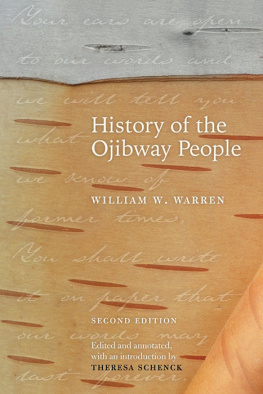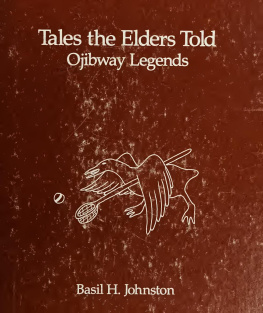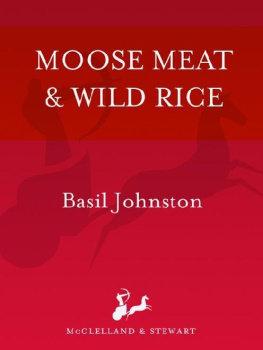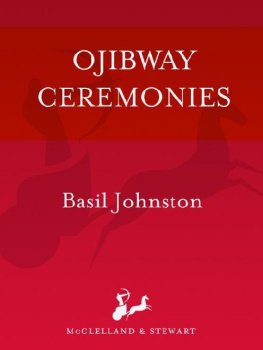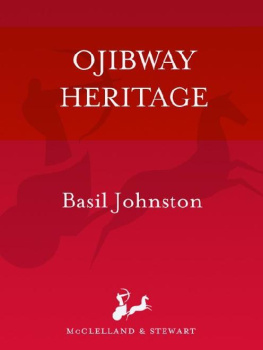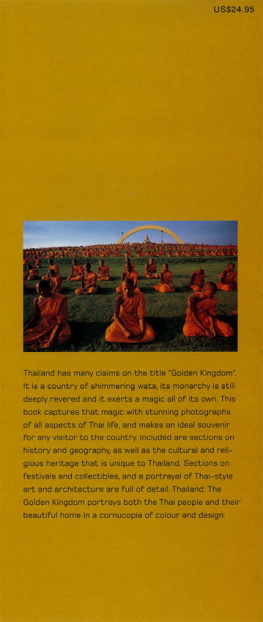Warren William Whipple - History of the Ojibway People
Here you can read online Warren William Whipple - History of the Ojibway People full text of the book (entire story) in english for free. Download pdf and epub, get meaning, cover and reviews about this ebook. City: St. Paul, year: 2009, publisher: Minnesota Historical Society Press, genre: Detective and thriller. Description of the work, (preface) as well as reviews are available. Best literature library LitArk.com created for fans of good reading and offers a wide selection of genres:
Romance novel
Science fiction
Adventure
Detective
Science
History
Home and family
Prose
Art
Politics
Computer
Non-fiction
Religion
Business
Children
Humor
Choose a favorite category and find really read worthwhile books. Enjoy immersion in the world of imagination, feel the emotions of the characters or learn something new for yourself, make an fascinating discovery.
- Book:History of the Ojibway People
- Author:
- Publisher:Minnesota Historical Society Press
- Genre:
- Year:2009
- City:St. Paul
- Rating:3 / 5
- Favourites:Add to favourites
- Your mark:
- 60
- 1
- 2
- 3
- 4
- 5
History of the Ojibway People: summary, description and annotation
We offer to read an annotation, description, summary or preface (depends on what the author of the book "History of the Ojibway People" wrote himself). If you haven't found the necessary information about the book — write in the comments, we will try to find it.
History of the Ojibway People — read online for free the complete book (whole text) full work
Below is the text of the book, divided by pages. System saving the place of the last page read, allows you to conveniently read the book "History of the Ojibway People" online for free, without having to search again every time where you left off. Put a bookmark, and you can go to the page where you finished reading at any time.
Font size:
Interval:
Bookmark:

History of the Ojibway People
History
of the
Ojibway People
second edition
William W. Warren
Edited and annotated, with a new introduction by
THERESA SCHENCK

MINNESOTA HISTORICAL SOCIETY PRESS
New material 2009 by the Minnesota Historical Society. All rights reserved. No part of this book may be used or reproduced in any manner whatsoever without written permission except in the case of brief quotations embodied in critical articles and reviews. For information, write to the Minnesota Historical Society Press, 345 Kellogg Blvd. W., St. Paul, MN 55102-1906.
First published in 1885 by the Minnesota Historical Society as volume 5 of Collections of the Minnesota Historical Society. Reprinted with a new introduction 1984. Second edition 2009.
www.mhspress.org
The Minnesota Historical Society Press is a member of the Association of American University Presses.
Manufactured in Canada
10 9 8 7 6 5 4 3 2 1
The paper used in this publication meets the minimum requirements of the American National Standard for Information SciencesPermanence for Printed Library Materials, ANSI Z39.48-1984.
International Standard Book Number
ISBN 13: 978-0-87351-643-3 (paper)
ISBN 10: 0-87351-643-5 (paper)
E-book ISBN: 978-0-87351-761-4
Library of Congress Cataloging-in-Publication Data
Warren, William W. (William Whipple), 18251853.
[History of the Ojibways, based upon traditions and oral statements]
History of the Ojibway people / William W. Warren ; edited and annotated, with a new introduction by Theresa Schenck.2nd ed.
p. cm.
Originally published as: History of the Ojibways, based upon traditions and oral statements. St. Paul : Minnesota Historical Society, 1885. (Collections of the Minnesota Historical Society ; v. 5)
Includes bibliographical references and index.
ISBN-13: 978-0-87351-643-3 (pbk. : alk. paper)
ISBN-10: 0-87351-643-5 (pbk. : alk. paper)
1. Ojibway IndiansHistory. 2. Indians of North AmericaHistory. 3. Warren, William W. (William Whipple), 18251853. I. Schenck, Theresa M. II. Title.
E99.C6W32 2009
977.00497333dc22 2008046157
Contents
Introduction
William W. Warrens History of the Ojibway People is one of the earliest and most influential books ever written about the people also known as the Chippewa. It has long been recognized as a classic source of Ojibwe history and culture, a unique and valuable contribution to the study of the American Indian. First published in 1885 by the Minnesota Historical Society, thirty-two years after the authors death, it has subsequently been reprinted numerous times, always in the original format and with the original notes by Minnesota historian Edward D. Neill. An introduction by W. Roger Buffalohead was added in 1984, drawing attention to Warrens methodology and some of the problems of the text, without, however, contributing to our understanding of the original work.
By writing this history, Warren hoped to save traditional Ojibwe stories for posterity even as he presented to the American public a sympathetic view of a people he believed were fast disappearing under the onslaught of a corrupt frontier population. He knew that aboriginal people had a history that needed to be preserved and that this history was not to be found in documents. He also believed that many of their oral traditions could be substantiated in written records and always intended to compare his work with documentary evidence someday. But knowing that his would not be a long life, he was driven to publish his History of the Ojibway People even before it was ready. A glance at the last two chapters of this text shows that his book, like his life, was unfinished.
The availability of documents unknown or inaccessible to Warren makes it now possible to do what he was never able to do: to correlate his writing with seventeenth- and eighteenth-century sources. Many criticisms of his History have resulted from insufficient information about the time and circumstances under which the book was written. Other criticisms have arisen from contemporary perspectives that do not take into account mid-nineteenth-century knowledge and thought. At the same time, some revision has been necessary owing to advances in archaeology and methods of dating, as well as the availability of French and British colonial manuscripts that were unavailable to the author. And finally, recent studies have shed new light on both the author and the history of the manuscript.
The Author
William Whipple Warren was born in 1825 on Michaels Island (later Madeline Island) in Lake Superior, the eldest son of American fur trader Lyman Marcus Warren and his Ojibwe-French wife, Marie (Mary) Cadotte. Ojibwe was his first language and, in fact, the only language spoken in the Warren household. His earliest teachers were his mother, his Ojibwe grandmother, and her brother Tug waug aune, chief of the Crane clan of the Chequamegon region. From them he heard the ancient stories used to educate all Ojibwe children, and he grew to know and love the rich traditions the stories imparted. He would one day himself become one of these much-admired storytellers.
Warrens earliest formal education was in the Protestant mission schools for Indian children, first on Mackinac Island (183132) and then at La Pointe (183236) where he was one of many mixed-blood children learning the rudiments of reading and writing. In 1836, he accompanied his grandfather Lyman Warren to his home in Clarkson, New York, to attend Clarkson Academy. The following year he entered the Oneida Institute in Whitesboro, New York, a Presbyterian school that aimed to blend a liberal education with manual labor, under the direction of abolitionist Rev. Beriah Green. Here, Warren pursued his studies in the juvenile department, following a course common to the grammar schools of the time, learning the principles of arithmetic, English grammar, geography, and the Greek of Matthews Gospel.
Warren left the Oneida Institute in 1840 and returned home to La Pointe the following year. His sister Mary wrote that he had not entirely forgotten the Chippewa language, his mother tongue, but in a very short time would speak it almost as fluently as the English. Soon, he was sitting with the storytellers, exchanging his recently learned tales for their ancient ones. Later, he would be best remembered at this time as full of life, cheerfulness and sociability, giving bold descriptions, telling heroic incidents, wonderful fairy tales from the Arabian Nights, Robinson Crusoe, etc. to crowds of eager listeners, Indians of all classes, both old and young, and they in turn would relate the oft told stories and traditions of the tribe.
At the end of 1842, Warren, then seventeen, was hired as the Ojibwe interpreter for the La Pointe subagency, a position that enabled him to continue his interest in the traditional stories of his mothers people. As he himself later wrote, however, he found it a difficult and uncertain task to collect from the Indians events of their past that could be relied on as facts. He realized that, as these stories passed down from generation to generation, they lost something of their accuracy, since the same stories and traditions varied considerably from one Indian to another, each storyteller seeming to contradict the other. Even Buffalo, his grandmothers cousin, concluded his stories with a mess of nonsense about events that had occurred within Warrens own memory. He was often discouraged and almost gave up his inquiries altogether.
Font size:
Interval:
Bookmark:
Similar books «History of the Ojibway People»
Look at similar books to History of the Ojibway People. We have selected literature similar in name and meaning in the hope of providing readers with more options to find new, interesting, not yet read works.
Discussion, reviews of the book History of the Ojibway People and just readers' own opinions. Leave your comments, write what you think about the work, its meaning or the main characters. Specify what exactly you liked and what you didn't like, and why you think so.

